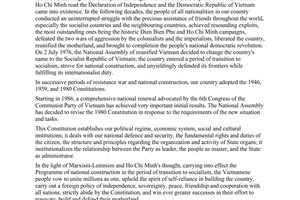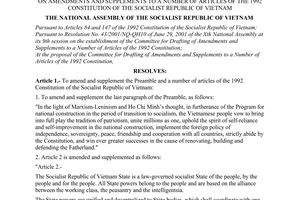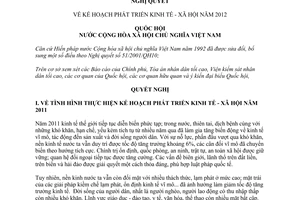Nội dung toàn văn Resolution No. 11/2011/QH13 on the 2012 socio- economic development plan
|
THE
NATIONAL ASSEMBLY |
SOCIALIST
REPUBLIC OF VIET NAM |
|
No. 11/2011/QH13 |
Hanoi, November 9, 2011 |
RESOLUTION
ON THE 2012 SOCIO- ECONOMIC DEVELOPMENT PLAN
THE NATIONAL ASSEMBLY OF THE SOCIALIST REPUBLIC OF VIETNAM
Pursuant to the 1992 Constitution of the Socialist Republic of Vietnam, which was amended and supplemented under Resolution No. 51/2001/NQ-QH10 bổ sung điều của Hiến pháp nước cộng hoà xã hội chủ nghĩa Việt Nam năm 1992">51/2001/QH10;
Considering reports of the Government, the Supreme People’s Court, the Supreme People’s Procuracy, the National Assembly agencies and related agencies and opinions of National Assembly deputies;
RESOLVES:
I. ASSESSMENT OF THE IMPLEMENTATION OF THE 2011 SOCIO- ECONOMIC DEVELOPMENT PLAN
In 2011, the world economy continued to experience complicated developments. At home, natural disasters and epidemics, together with difficulties, limitations and weaknesses which had accumulated over the past years, exacerbated macroeconomic changes and affected production and daily-life activities. Through our great efforts to overcome difficulties, our economy has managed to maintain a growth rate of around 6% with positive changes in the macro-balances. The political situation remains stable, national defense, security and social order and safety are firmly maintained, while foreign relations are further strengthened. Border, land and sea territory and island issues have been properly settled in accordance with international law.
However, many challenges are still facing our economy. Inflation remains high while the undesirable effects of measures taken to curb inflation and stabilize the macro-economy have slowed down the economic growth. Difficulties are still seen in the life of people, especially the poor and low- income workers. Many shortcomings still exist in education and training, health, culture and sports, while burning social issues such as crimes, traffic accidents and congestion and environmental pollution remain serious.
II. 2012 OBJECTIVES AND MAJOR TARGETS
It is predicted that in 2012, the global economy will still witness unforeseeable changes. In the country, limitations and weaknesses will be exposed more deeply. Macroeconomic administration will face difficulties in harmoniously addressing the relation between stabilizing the macro- economy, curbing inflation and maintaining a reasonable growth rate. The above-mentioned situation and trend will create both advantages and challenges which require drastic and concentrated leadership and direction as well as utmost promotion of internal strengths all over the country.
1. General objectives
To give priority to curbing inflation, stabilizing the marco-economy and maintaining a reasonable growth rate in association with renewing the growth model, restructuring, and raising the quality, effectiveness and competitiveness of, the economy; to assure social welfare and security and improve the people’s life; to firmly maintain political stability, consolidate national defense and assure national security and social order and safety; to improve the effectiveness of external relations and international integration.
2. Major targets a/ Economically:
The gross domestic product (GDP) will increase by 6-6.5%.
The total export turnover will grow by 13%. Trade deficit will equal 11-12% of the total export turnover. To strive to reduce the trade deficit to below 10% of the total export turnover, if conditions permit.
To strive to reduce the budget deficit to below 4.8% of GDP.
The total development investment capital of the entire society will represent some 33.5% of GDP.
The consumer price index will increase at below 10%. b/ Socially:
To create around 1.6 million jobs.
The urban unemployment rate will be around 4%.
Trained laborers will account for 46% of the total workforce of the economy.
The poverty rate will drop by 2%, particularly by 4% in poor districts.
The malnutrition rate among under-5 children will drop to below 16.6%. The number of hospital beds per 10,000 inhabitants (excluding hospital beds at commune health stations) will be 21.5. c/ Environmentally:
The rate of seriously polluting establishments handled will reach 79%.
The rate of operating industrial parks and export-processing zones having a centralized wastewater treatment system up to environmental standards will reach 70%.
The rate of forest coverage will be 41%.
III. A NUMBER OF MAJOR TASKS AND SOLUTIONS
1. To assign the Government to early complete and report to the National Assembly at its 3rd session an overall scheme on economic restructuring in association with renewal of the growth model in the direction of raising the quality, effectiveness and competitiveness, for synchronous implementation in all industries and sectors nationwide under an appropriate roadmap.
To restructure investment, focusing on incrementally reducing the proportion while raising the effectiveness of public investment. To formulate mechanisms and policies to direct and promote socialization of investment activities. To raise the quality and sustainability of foreign direct investment capital sources.
To restructure the financial market with a focus on restructuring the system of banks and financial institutions. To raise the quality of services and increase the safety of the system; to gradually reduce the mobilization of investment capital mainly from bank credits; to create conditions for enterprises to raise capital from the capital market; to strictly control operations of securities companies; to increase the effectiveness of insurance operations; and to effectively control investment funds to prevent speculation and market manipulation.
To structure enterprises of all economic sectors, focusing on state economic groups and corporations. To increase the governance capacity of state enterprises; to make transparent finances and production and business results as a measure to increase the safety level of the economy. To facilitate access to loans by small- and medium-sized enterprises, export processing enterprises and enterprises processing agricultural products or producing consumer goods which directly serve daily-life activities of people, create jobs and generate incomes for laborers.
2. To assure synchronous coordination among state management agencies and local administrations’ observance and strict implementation of policies aiming to attain the primary objective of curbing inflation. To intensify the management, oversight and control of government debts, public debts and national overseas debts. To strictly and prudently implement fiscal, monetary and import-export policies. To tightly control the consumer price index for it to increase at a low rate and be gradually stabilized from month to month so as to reach the target set for the whole year. To use the surplus revenue amount of 2011 firstly to offset the budget deficit, repay debts or reduce loans. To strictly control and reduce imports to the utmost, especially non-essential consumer goods.
To take the initiative in controlling prices, assuring the supply-demand balance and stabilizing market prices; to intensify the supervision of the observance of the law on price and enhance market control so as to prevent speculation and resolutely fight against smuggling and trade fraud.
3. To further step up the development of industries, especially added-value services and products of competitive edge capable of joining global value chains, in order to meet domestic and export demands.
To scrutinize and synchronously revise land, tax, credit, labor and market policies so as to increase investment in agriculture and rural development.
To take specific measures to promptly remedy consequences caused by natural disasters and epidemics to increase food production; to prioritize solutions to boosting agricultural, forestry and fishery production to help farmers raise their incomes and improve their lives; to build and develop clusters linking the production to processing, distribution and consumption of agricultural products; and to successfully implement the national target program on building a new countryside in conformity with local practical conditions.
To formulate mechanisms and policies to promote industrial and commercial development in service of agriculture and rural development; to review local industrial development master plans so as to improve the effectiveness of existing industrial parks and clusters; to concentrate investment in projects to generate power and produce petrochemical products, and further implement the policy of boosting export production.
4. To effectively realize the three strategic breakthroughs. In 2012, to concentrate on reviewing the implementation of, and preparing amendments and supplements to, the 1992 Constitution to serve as a foundation for the formulation and finalization of the legal system in a comprehensive, stable and transparent manner. To accelerate law dissemination, enhance administrative discipline and the rule of law in the executive apparatus. To increase investment in human resources and arrange sufficient resources for the implementation of the salary reform policy. To increase inspection, examination and rectification of universities recently upgraded from colleges and newly established universities. To promote the role of research institutes and scientists in appraising socio- economic development policies, programs and projects. To increase the capacity of applying scientific and technological advances in key sectors and areas in which physical foundation and human resource conditions have been basically satisfied. To review and evaluate projects on development of transport infrastructure, especially those in key economic areas, and allocate investment capital for these projects to be completed and put into operation right during 2012-2013. To effectively utilize land areas reserved for transport infrastructure development, combining land use planning with transport infrastructure planning so as to acquire more funds outside the state budget.
5. To further realize social security policies and effectively implement the program on fast and sustainable poverty reduction, especially in areas facing natural disasters, epidemics or difficult or extremely difficult socio- economic conditions; to make pubic and transparent and simplify administrative procedures so as to timely render support to people. To further adopt policies to support poor households, households living just above the poverty line and social policy beneficiaries who are greatly affected upon adjustment of electricity, petroleum and coal prices and public service charges under the market mechanism. To increase the level of health insurance premium supports for target beneficiaries and support farmers in participating in the program on health insurance for all. To implement national target programs on health, employment, vocational training and poverty reduction and, at the same time, study and adjust the mechanism of implementing poverty reduction policies to concentrate resources on achieving the poverty reduction goal in a more effective manner.
6. To further adopt mechanisms, policies and measures to plant and protect forests. To manage, exploit and effectively use land, water and mineral resources and other resources. To announce the national program on response to climate change and sea level rise for each area and locality and specific implementation plans for people to feel secure and take the initiative in preventing and mitigating regrettable damage. To concentrate efforts on remedying environmental pollution in economic zones, industrial parks, export-processing zones, craft villages and hospitals and conduct regular inspection and examination so as to promptly detect and handle violations.
7. To increase the quality and effectiveness of investigation, prosecution, trial and judgment execution work. To renew the organization and operation of judicial agencies on the basis of placing the court at the central position and regarding trial as the focal activity of judicial reform. To increase physical foundations and personnel for judicial agencies. To enhance responsibilities of procuracies in the process of investigation and trial so as not to allow criminals to escape and innocent people to be unjustly sentenced; and to pay attention to justice consolidation and improvement of the quality of operation of judicial support agencies.
8. To increase and strengthen national defense and security potential in local defense zones, particularly key, border and island areas; to closely combine economic development with national defense and security and incorporate this task into strategies, master plans, plans as well as every development investment project; to boost the development of defense and security industries; and to invest in the development of economic-defense zones and sea and island areas. To accelerate mass agitation work, build firm and comprehensive foundations and further consolidate the national defense and security disposition. To intensify the prevention and combat of violations and crimes, especially organized and transnational crimes and economic, position-related and corruption crimes; to strictly handle acts of resisting on-duty persons. To prevent social vices, control and reduce traffic accidents and step by step tackle traffic congestion in major cities.
9. To further expand and harmoniously address external relations, stabilize, further develop and deepen the relationship with partners, especially neighboring and regional countries, big countries, potential partners and traditional friends, so as to create a peaceful and stable environment for national development and defense. To properly implement international commitments. To struggle to protect the country’s legitimate interests in commercial disputes; to consolidate mechanisms for directing and implementing international agreements. To better study and forecast about new developments in the world and the region and promptly detect and handle arising matters to secure the national construction and defense.
IV. ORGANIZATION OF IMPLEMENTATION
The Government, the Supreme People’s Court, the Supreme People’s Procuracy shall, according to their respective functions, organize the effective implementation of the National Assembly’s Resolution.
The Standing Committee, the Ethnic Council and Committees of the National Assembly, the delegations of National Assembly deputies and individual National Assembly deputies shall supervise the implementation of this Resolution.
The Vietnam Fatherland Front Central Committee, member organizations of the Front and lawfully established social organizations shall oversee and mobilize people of all strata to properly implement the National Assembly’s Resolution.
The National Assembly calls upon compatriots and combatants throughout the country and overseas Vietnamese to heighten the spirit of patriotic emulation and unity, spare effort, seize favorable opportunities and surmount difficulties and challenges in successfully implementing the 2012 socio-economic development plan, creating a prerequisite for the comprehensive fulfillment of the five-year 2011-2015 plan.
This Resolution was adopted on November 9, 2011, by the XIIIth National Assembly of the Socialist Republic of Vietnam at its 2nd session.-
|
|
CHAIRMAN
OF THE NATIONAL ASSEMBLY |


